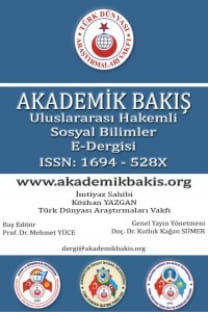THE POSIBILITY OF MULTICULTURAL PRACTISE DURING THE AGE OF COLLECTIVE IDENTITIES IN LINE WITH ARAB SPRING
Öz
Globalization, postmodern culture and the progress in the transportation and communication enforced to increase the multicultural living within the world, especially in Europe. Nevertheless Europe has a trouble in managing to give the representation for the different cultures because of many reasons in last decade. After the global financial crisis suffered in 2008, Europe faced with huge economic problems. During this period of time, the rebellion and upheavals against the dictatorial regimes we witnessed in Middle East, called as Arab Spring, led to the revenge of the existing regimes and eventually civil wars. As a result of these civil wars, the immigrant issue come to the European agenda. The main problem was not merely the flux of the immigrants into Europe but their cultures they bring together. The European officials envisaged that the different cultures of Middle Eastern refugees may distort the cultural harmony in Europe. This fear has been called as Islamophobia, xenophobia and sometimes as racism because of the popular protests in European streets. In this article, I will attempt to elucidate the multicultural practice of Europe and its potential to include the different collective identities with theoretical perspective.
Anahtar Kelimeler:
Perception, Immigrant Issue, Multiculturalism, Arab Spring
___
Bayart, J-F., L’illusion identitaire. Paris: Fayard, 1996, s.26. Benda-Beckmann, K.von, Verkuyten, M., Introduction: cultural identity and development in Europe. İçinde: Benda-Beckmann, K.von, Verkuyten, M. (eds.), o.c., 1995, p.17. Beverly Milton- Edwards, Contemporary Politics in Middle East, USA: Polity Press 2005. Boëtsch et C. Villain-Gandossi, eds., Stéréotypes dans les relations Nord-Sud. Hermès.Cognition. Communication. Politique. N°30. Paris: CNRS éditions, 2001. Carl Brown, Modernization in the Middle East, UK: The Darwin Press 2011 Dumont, L., Essais sur l’individualisme. Une perspective anthropologique l’idéologie moderne. Paris: editions du Seuil, 1983, p.119. Dumont, L., Polémiques sur l’histoire coloniale. Maniére de voir 58. Paris: Le Monde diplomatique, Juillet-Ağustos, 2001. Erikson, E.H., Identity, psychosocial. In: D.L. Sills, ed., International Encyclopaedia of the Social Science. The Macmillan Company & The Free Pres, 1968, V. 7, p.61. Herder, J.G., Ideen zu einer Philosophie der Menchheit, 1784; id.; une autre philosphie de l’histoire, 1774. Hinnebusch Raymond, The International Politics of the Middle East, UK: Manchester University Press 2003 İnaç, H., “Identity Problems of Turkey during the European Union Integration Process,” Journal of Economic and Social Research, 6 (2), 33-62 (2004), s.34 Jeff Goodwin and James M. Jaspers, The Social Movements Reader: Cases and Concepts, UK: Blackwell Publishing 2006 Maurice Harari, Government and Politics of Middle East, USA: American Association of Middle East Press 2011 Meir Hatina, Identity Politics in the Middle East, USA: Taurist Academic Studies 2007. M. E. Ahrari, Change and Continuty in the Middle East, UK: McMillan Press 1996. Pareto, V., Traité de sociologie générale. (Euvres complétes, Cilt XI, ed. Busino G.). Genéve: Librairie Droz, 1968 (1917-1919, 2.cilt), 1089-1112. Paul Dresch, Monarchies and Nations: Globalization and Identity in the Arab States of Gulf, USA: Tauris Press 2005. Roosens, E., Ethnicity as a creation: some theoretical reflections. İçinde: Benda-Beckmann, K.von, Verkuyten, M. (eds.), Nationalism, ethnicity, and cultural identity, Utrecht University, 1995, p.30.- Başlangıç: 2004
- Yayıncı: Akademik Bakış
Sayıdaki Diğer Makaleler
İSLAM ÖNCESİ İLE İLK TÜRK-İSLAM DEVLETLERİNDE SİYASİ YAPI VE DIŞ İLİŞKİLERİN KIYASLANMASI
ÇEVRE EĞİTİMİ VE BİLİNCİ ARAŞTIRMASI
TÜRKİYE’DE YAŞAYAN GÖÇMEN AİLELERİN VE GÖÇMEN OLMAYAN AİLELERİN ANNE TUTUMLARININ İNCELENMESİ
Hande HALAVURT, Elvan ŞAHİN ZETEROĞLU
İKTİSADÎ AÇIDAN ÇİN-AFRİKA İLİŞKİLERİNİN DEĞERLENDİRİLMESİ
Uğur Selçuk AKALIN, Kaan YİĞENOĞLU
BULUŞ YOLUYLA ÖĞRETİM STRATEJİSİNİ TARİH DERS KONULARINA UYGULAMA
Zeynep TAŞYÜREK, Meral METİN GÖKSU, Tuğba SÖMEN
TÜRK CUMHURİYETLERİ ALFABE BİRLİĞİ BAĞLAMINDA KÜTÜPHANE VERİ TABANI OTORİTE KÜTÜKLERİNİN ÖNEMİ
TARIM-GIDA POLİTİKALARI BAĞLAMINDA TÜRKİYE’DE GIDA GÜVENCESİ
